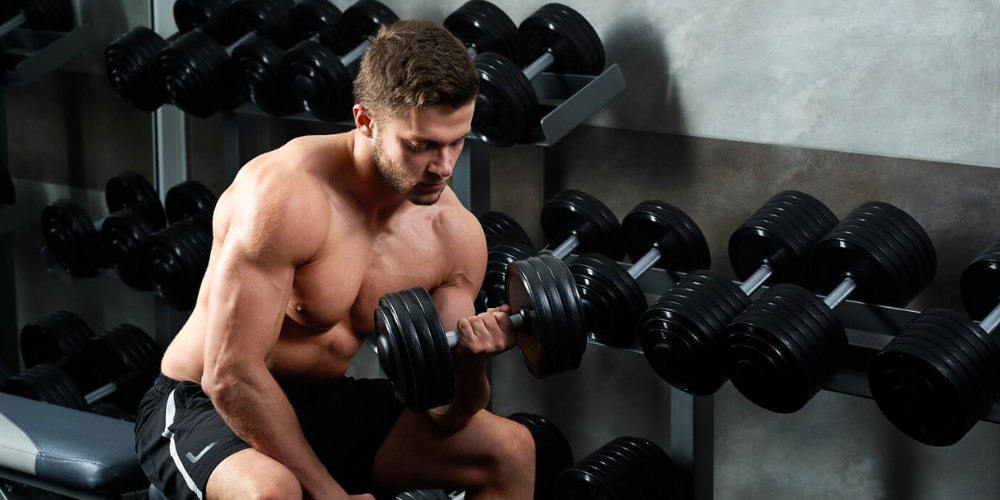
8 Foods That Help Build Muscle and Boost Workout Results

Gaining muscle isn’t only about lifting heavy or spending more hours at the gym. What really drives results is how well your body recovers, and that’s heavily influenced by what ends up on your plate. A workout breaks down muscle fibers—nutrition rebuilds them. So if results have hit a plateau, it might be time to rethink what’s fueling the gains.
Eating for muscle growth means bringing in foods that help repair tissue, reduce inflammation, and support overall strength. That includes a balance of protein, carbs, healthy fats, and essential nutrients.
How Food Helps Muscle Grow
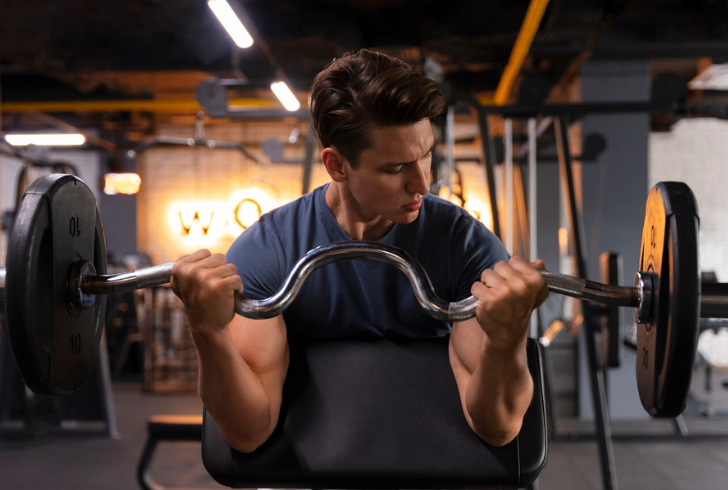
Freepik | Protein and energy rebuild muscle fibers damaged during exercise, leading to growth.
Muscle growth starts with breaking down muscle fibers during workouts. Afterward, your body repairs those fibers by using amino acids from protein, supported by energy from carbohydrates and other nutrients. For this process to be effective, you need enough total calories—because building muscle in a calorie deficit is like trying to fill a pool with a leak in the bottom.
According to the National Academy of Sports Medicine, an ideal muscle-building approach includes:
1. 0.7 to 0.8 grams of protein per pound of body weight daily
2. 1.8 to 3.2 grams of carbohydrates per pound of body weight daily
While protein is the main building block, carbs provide energy for performance and recovery. Micronutrients like B vitamins, iron, and magnesium also play a key role in muscle function and repair.
Muscle-Boosting Foods That Actually Make a Difference
Let’s get into the real food that helps maximize strength and muscle gains:
1. Eggs
Eggs are compact nutritional powerhouses. One large egg delivers a complete source of protein—meaning it includes all nine essential amino acids. Leucine, one of these amino acids, plays a big role in muscle protein synthesis. On top of that, eggs bring in vitamins like B12 and B6, both of which support muscle function and energy production.
2. Fish
Tuna, salmon, and other fish are packed with high-quality protein, which supports recovery and muscle building. They’re also rich in omega-3 fatty acids, which have been shown to help preserve muscle mass and improve muscle function. If your diet is already high in fats, lean fish like cod or tilapia still offer protein without overdoing the calories.
3. Nuts
Snacking on nuts is an easy way to sneak in protein and healthy fats. Almonds and walnuts are top choices—they’re rich in fiber and provide magnesium, which helps with muscle contraction and repair. Just keep an eye on portion sizes since the calories can add up fast.
4. Soybeans
For those following a plant-based plan, soybeans (or edamame) are among the best muscle-building foods. They offer a full protein profile—rare among plant foods—and also bring in iron, which supports oxygen flow to your muscles during workouts.
5. Greek Yogurt
Greek yogurt stands out because it has both whey (fast-digesting) and casein (slow-digesting) proteins. This combo supports muscle repair over an extended period, making it a great post-workout or evening snack. Bonus: it has probiotics that support gut health, which plays a role in nutrient absorption.
6. Cottage Cheese
Cottage cheese delivers more protein per serving than many other dairy options. It’s especially high in casein, which digests slowly and helps reduce muscle breakdown overnight. It’s also useful for people trying to gain weight while keeping protein intake high.
7. Olive Oil
While not a protein source, extra virgin olive oil adds quality fats that help reduce inflammation—important after hard training sessions. Research suggests that olive oil may support muscle preservation, especially as you age or when cutting calories.
8. Quinoa
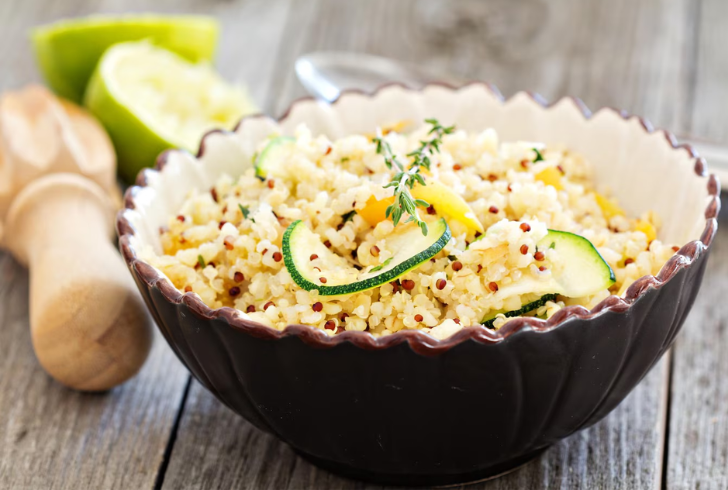
Freepik | fahrwasser | Get your protein, fiber, complex carbs, magnesium, and iron from quinoa, the muscle-friendly seed.
Often mistaken for a grain, quinoa is actually a seed that serves up protein, fiber, and complex carbohydrates. It’s also packed with magnesium and iron—two minerals that support muscle function. This makes quinoa a great base for meals when you’re increasing muscle mass.
Putting It All Together for Results
Muscle gains don’t happen overnight. The key is consistency—both in training and in nutrition. Foods rich in protein, combined with smart carbs and healthy fats, create the foundation for muscle growth. Including these eight options regularly will support better workouts, improved recovery, and real changes in strength.
Also important? Timing. Eating protein within an hour or two post-workout helps speed up the recovery process. Getting enough rest matters too—because muscles grow when you’re not in the gym.
Tips to Support Muscle Growth
– Eat enough calories, muscle won’t grow without fuel.
– Prioritize whole, nutrient-rich foods over supplements.
– Include high-protein options at every meal.
– Mix fast and slow-digesting proteins for sustained recovery.
– Combine resistance training with smart eating for best results.
Adding the right foods into your daily meals gives your body what it needs to rebuild, recover, and build real strength. Whether you’re just starting out or looking to break through a plateau, these nutrition tips can make your workouts count—and your muscles show it.
More in Body
-
`
Are Mono Diets Worth It – or Just a Dangerous Trend?
As summer brings on the pressure to slim down fast, the internet lights up with diet trends promising instant results. One...
August 3, 2025 -
`
Why Motivation Is Essential for Sustainable Fitness Success
Motivation isn’t something that shows up when it’s convenient—it’s something that needs to be built, shaped, and sustained. Many people struggling...
July 27, 2025 -
`
The Mystery of Human Body Parts That Science Still Can’t Solve
The human body is a patchwork of evolutionary choices, quirks, and mysteries. From skeletal structure to the tiniest gland, everything tells...
July 18, 2025 -
`
Why a Mediterranean Diet and Exercise Slow Bone Loss in Seniors
Bone health isn’t just a concern for the elderly—it’s something that starts to matter the moment the body begins to lose...
July 12, 2025 -
`
Want Better Memory? This Diet Could Help Keep Your Brain Sharp
Losing focus, memory lapses, or slower thinking—these aren’t just normal parts of aging. While cognitive changes do happen over time, lifestyle...
July 5, 2025 -
`
The Truth About Health Tracking Apps and Their Impact on Wellness
Scroll through social media or browse the App Store, and you’ll likely spot dozens of health tracking apps. They promise everything—from...
June 29, 2025 -
`
New Study Reveals Alzheimer’s Affects the Entire Body
Most people associate Alzheimer’s with memory loss and cognitive decline, assuming its impact stays confined to the brain. But new findings...
June 21, 2025 -
`
The One Simple Habit Mark Cuban Credits for His Success
Success doesn’t come from shortcuts or luck—it’s built on habits that stand the test of time. Mark Cuban, the outspoken billionaire,...
June 14, 2025 -
`
Thinking of a Detox Diet? Read This Before You Start
Detox diets continue to be one of the most talked-about trends in the wellness space. Whether it’s juice cleanses, tea plans,...
June 8, 2025

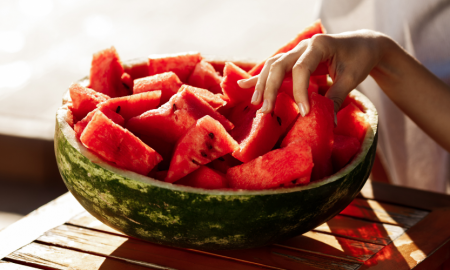
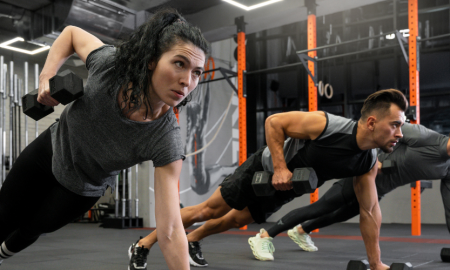





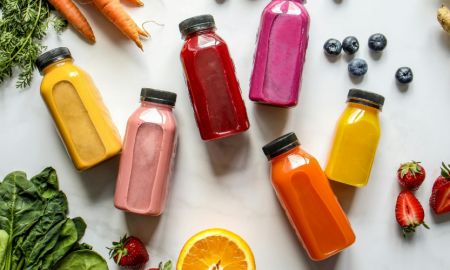
You must be logged in to post a comment Login